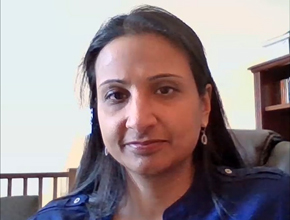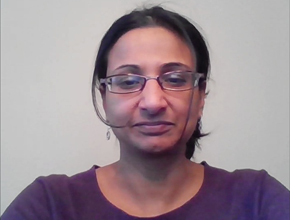Dr Mark Loeb, professor in the Department of Pathology and Molecular Medicine and Michael G. DeGroote Chair in Infectious Diseases at McMaster University, joins Dr Roman Jaeschke to explore in detail the current epidemiologic situation, treatment predictions, and essential recommendations for health-care personnel.
Roman Jaeschke, MD, MSc: Good afternoon. Welcome to another edition of McMaster Perspective. I would like to introduce to you Doctor Mark Loeb, who is our expert in a number of viral diseases.
Mark, you probably published more than 100 papers on influenza. I wonder how it would help us to hear your opinions and predictions about coronavirus disease 2019 (COVID-19). The floor is yours.
Mark Loeb, MD, MSc: I would be glad to do that. I think the first thing at this point is that for COVID-19 the epidemiology is rapidly evolving. Day by day we get more information, starting with a relatively large outbreak in an epicenter in China and now that’s evolved to spread in a number of countries, where the epidemiologic link is being lost. For example, there are cases coming up from Iran and now Italy where there is no known epidemiologic link to the actual epicenter. That’s suggesting there’s an ongoing transmission in a number of countries and that this is going to evolve into a global pandemic.
Roman Jaeschke: By an epidemiological link you mean that we do not have the individual who is spreading a specific disease. So what should we expect? I understand that it’s speculation.
Mark Loeb: Of course we’re not completely certain, but we know that in terms of people who are infected, 80% will have only mild to moderate illness and about 20% have more severe illness requiring hospitalization. The case fatality rate has been ranging from 2% to 4%, depending on the day.
One of the difficulties is that we probably do not have the correct denominator. There’s likely a number of people who’ve been infected and might’ve had inapparent infection. They might’ve had symptoms, but it was never brought to medical attention. For that usually we want seroepidemiologic data: we take blood at baseline and after a certain period of time and we look at the number of people who are infected. With that denominator, it’s likely that figures like the case fatality rate would diminish, at least to some extent.
Roman Jaeschke: This is reassuring. What should we be doing in the meantime?
Mark Loeb: I think it’s pretty evident that today we should be making plans, almost like pandemic preparations. For example, right now in Canada the diagnostic testing has been limited to public health laboratories, and that’s just not going to be sustainable as the situation evolves. The diagnostic testing has to evolve, it has to become decentralized, so all laboratories that normally test for viruses can become proficient at detecting this novel coronavirus. So that’s one thing in terms of diagnosis.
In terms of clinical trials that are just beginning for treatment for various antivirals, I think that’s important. There’s also the initiation of studies for vaccines. But that’s going to be 6 or 12 months, or probably longer down the road. So clearly the best way to deal with this is prevention, but that’s going to take a lot of time.
The immediate things are, first, to adequately ascertain cases, and for that we need good diagnostic tests that are done with good turnaround time. We need to step up our ability to promote infection control, particularly in hospitals, where we know that the coronavirus—especially with the experience of severe acute respiratory syndrome (SARS) and Middle East respiratory syndrome (MERS)—tends to spread relatively rapidly among health-care workers. So it is really important that everybody is up to date in terms of procedures for preventing transmission, particularly within hospitals.
Roman Jaeschke: What are those procedures?
Mark Loeb: It’s respiratory precautions, where people wear gloves and gowns. An important component of this—and this is a real source of controversy—is the type of personal respiratory protective equipment that should be worn. It’s interesting because right now it’s all over the map: the US Centers for Disease Control and Prevention (CDC) recommends an N95 respirator both just for routine medical care and for aerosol-generating procedures, like intubation or bronchoscopy. There’s consensus that the N95 respirator should be used for those types of procedures that generate aerosols. What’s in debate, however, is what to use to protect nurses and physicians when they’re just doing routine medical care. The World Health Organization (WHO) recommends the surgical or medical mask; these terms are interchangeable. The European Centre for Disease Prevention and Control (ECDC) sides with the US CDC and are saying to use an N95 respirator for any care. In Canada it’s almost a mixed bag by province, although federally the recommendation is to use a medical mask for non–aerosol generating procedures. Ontario and Quebec have decided to use only the N95 respirator.
This is quite an important issue because stockpiles of N95 respirators are becoming depleted and we really need to preserve these for aerosol-generating procedures. It’s an important area for research to compare the medical masks.
Roman Jaeschke: Are all those masks one-time use?
Mark Loeb: There are different procedures. Most of the time they’re one-time use. It’s preferable to be able to use the medical mask or the N95 respirator and get rid of it after it’s used, but it’s not required to be used when you’re not involved with the patient. We’re talking about using these for direct patient care.
Roman Jaeschke: Thank you very much for this part. We’ll come back for another session very shortly.
Mark Loeb: You’re very welcome.
 English
English
 Español
Español
 українська
українська









